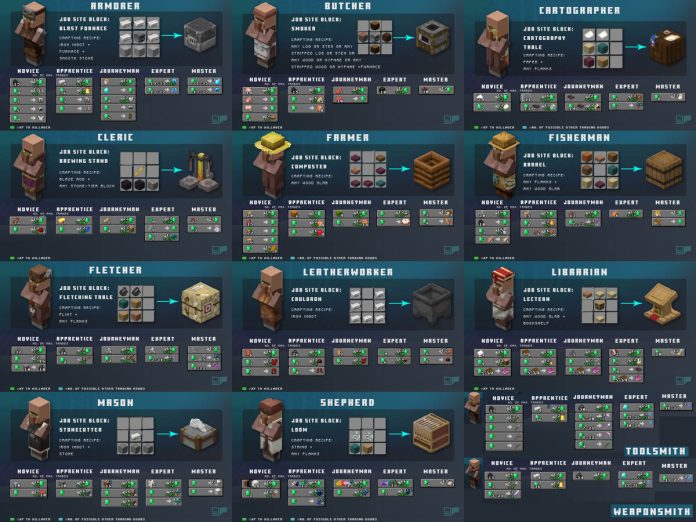Villager trading is a crucial component of Minecraft. It facilitates the buying of certain items and is an engaging aspect of gaming that benefits the players that pursue particular trades.
When trading with the locals, one may get everything from enchanted books to potions and maps. In Minecraft villages, you may find them going about their daily lives.
In the Minecraft game, trading with villagers is rather straightforward.
The accessibility, price, and quality of trades are influenced by a number of variables. These variables include the occupation, level, supply, demand, reputation, and mood of the villager.
How to trade with villagers in Minecraft
You must first locate a village before you can begin trading. In the game Minecraft, villages are randomly produced structures that may appear in a variety of biomes, including plains, savanna, taiga, desert, snowy tundra, or mountains. Village chests may also hold emeralds or other loot.
Depending on their biome and job, the villagers, or occupants, have unique looks and attire.
For villagers, there are 15 possible occupations in Minecraft, including butcher, armorer, cleric, farmer, fisherman, leatherworker, librarian, mason, shepherd, toolsmith, weaponsmith, nitwit, and the unemployed.
Other professions include farmer, fisherman, fletcher, shepherd, toolsmith, and shepherd.
To provide trades related to their job, villagers must claim a specific workstation block in each domain.
Emeralds are the main form of payment for trading with villagers in the game Minecraft. By mining emerald ore, plundering chests in towns or other buildings, or engaging in direct trade with locals, one may get these emeralds.
In return for emeralds, many villagers will either purchase particular items from players, such as crops from farmers or paper from libraries, or sell items to players, such as armor from armorers or maps from cartographers.
In certain transactions, substitutes for emeralds may be used, such as rotten flesh for clerics or gravel for masons.
A villager gains trade XP when you approach them and trade with them if the trade is successful.
If you repeat it enough, their level of trading will increase. Each villager has access to one of five separate trading levels. These are as follows:
- Novice (One Trade)
- Apprentice ( Two Trades)
- Journeyman (Three Trades)
- Expert (Four Trades)
- Master (Five Trades)
Gaining villager levels gives you access to more trades. You can determine any trader’s current rank by the colour of their badge on their attire.
As there are five distinct levels, there will be five colours for each.
- Stone (Novice)
- Iron (Apprentice)
- Gold (Journeyman)
- Emerald (Expert)
- Diamond (Master)
How to reduce the price of trades
You must be sure to treat the villagers well if you want to raise the calibre of your trade.
Reputation, a hidden score that fluctuates based on how you interact with villagers, affects trade quality. It also has an impact on the villagers’ mood and prices.
You may do measures that will further your good intentions to raise this score and maintain the good will of the villagers.
These activities include stopping raids on villages, trading often, rescuing zombie villagers, etc.
If you have a good reputation, you may get discounts and exclusive deals, however, if you have a negative reputation, prices will go up.
The “hero of the village” effect, which occurs after the village is successfully defended, causes a large decrease in the price of the items.
Be careful to trade before the hour-long time limit expires.
Occasionally, villagers may make a trade for only one emerald. When approaching these villagers to inquire about their trades, check for green particle effects hovering about them to identify them.
Also Read: 5 Tips To Get More Headshots In BGMI


